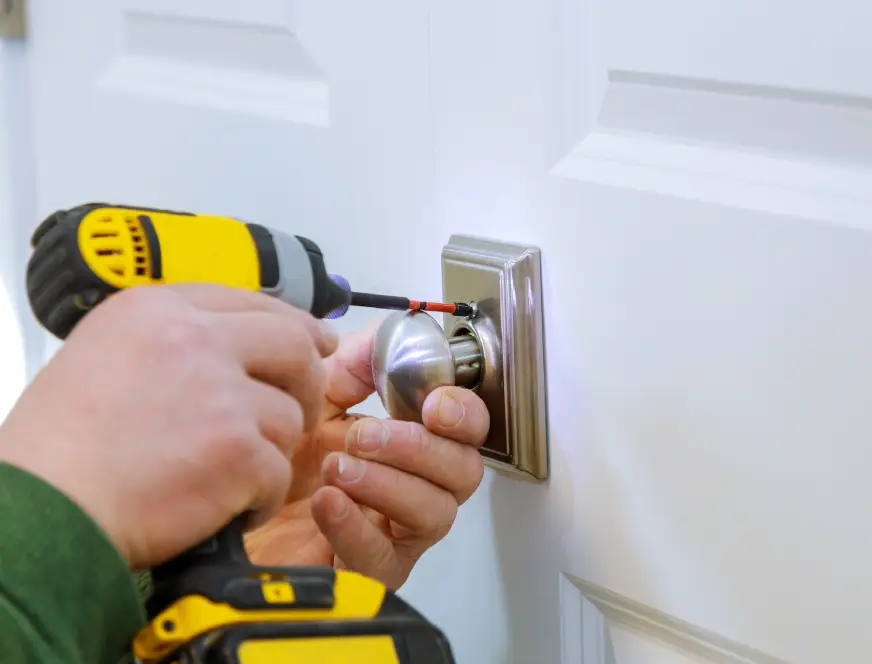Table of Contents
Just moved to your new home? Congrats. But it doesn’t end here. Sure, moving into a new home is an exciting journey, but it comes with its fair share of responsibilities. One of the most important aspects to consider when settling into your new space is ensuring the safety and security of your property and your family.
No doubt, decorating your new home is more fun than setting up security measures. But burglar strikes are more frequent than ever, which is why every new homeowner should begin with a solid home security checklist to make sure home security is not overlooked. To help you take control of your new home, here is some expert advice you should probably follow in case you are unfamiliar with the rules.
Change Your Locks Around the House
One of the first steps to achieving reliable in house security is replacing or rekeying all exterior locks. You may never know if the previous owners, tenants, or even contractors may still have access. Hiring a locksmith ensures that only you and your family can enter, giving you complete control from day one.
- Rekey garage and sliding doors
- Replace all exterior locks
Invest in a Security System
Installing a modern security system is one of the smartest moves you can make as a new homeowner. With motion sensors, cameras, and mobile alerts, today’s security systems offer more than basic protection, they give you real-time control and peace of mind, both when you’re home and away.
- Add motion sensors and alerts
- Monitor entry points remotely
Secure Doors and Windows
Don’t rely on old home security systems alone, physical barriers such as secure doors and windows matter just as much. When you move into your new home, reinforce doors with strike plates and deadbolts, secure windows with locks, and use rods on sliding doors. These measures prevent forced entry and strengthen your overall house security.
- Install locks on all windows
- Add door reinforcements
Outdoor Lighting
Well-lit exterior lighting can significantly reduce the chances of your home being the next unfortunate target for burglars. Motion-activated lights near key entry points not only boost visibility but also create a protected home feel. The reason behind this is that criminals tend to avoid well-lit spaces where they can be seen.
- Light up all entry areas
- Use motion-activated lighting
Landscaping Considerations
Your landscaping choices can play a big role in securing your new home. Trim overgrown bushes and trees near windows to eliminate potential hiding spots for intruders. For added protection, consider placing thorny plants beneath vulnerable windows or entry points to discourage break-ins.
- Use defensive plants near windows
- Remove potential hiding spots
Neighborly Relationships
A strong connection with your neighbours is an underrated part of a protected home. Building trust with those around you means more eyes on your property and faster responses to suspicious activity. Neighbours you have a good relationship with can report any suspicious activity on your property to the authorities in your absence and in return you can do the same for them.
- Report unusual activity
- Exchange contact info with neighbors
Get a Safe
Never make it easy for thieves to find your valuables. In addition to your security systems, invest in a secure safe for items like jewelry, documents, or cash. Choose a model that’s fire-resistant and bolted to the floor to prevent theft and place it in a discreet location, like a closet or basement of your home.
- Hide it in a discreet location
- Protect important items
Ongoing Maintenance
Home security isn’t a one-time task. Even top tier security setups need regular maintenance to operate without failing. Ensure all cameras, sensors, and alarms are working correctly. Replace batteries, update software, and test your system routinely to ensure your home is protected all the time.
- Replace batteries on schedule
- Test alarms and sensors regularly
Emergency Plans
No security system is complete without a plan for emergencies, because emergencies never wait for a convenient time. Be vigilant and create a family emergency plan that includes exit strategies and teaches everyone how to use alarm systems. In a critical moment, having a plan like this can save you from many unfortunate occurrences.
- Educate family on system use
- Map out emergency exits
Make Security a Habit, Not a One-Time Task
Securing your new home is not something you handle once and forget. It requires ongoing attention, regular updates, and a commitment to keeping your family and property safe. Make routine security checks part of your schedule and stay alert to any changes around your home. The more consistent your efforts, the stronger your protection will be.
How Biometric and Smart Locks are Shaping the Future of Security
Frequently Asked Questions – FAQs
How to secure a new home?
Install simple security devices
Invest in a burglar alarm
Invest in security cameras
Trade a bit of privacy for added security
Shine a light
Keep valuables out of easy sight
Can I take my security system when I move?
You can take your existing system with you and install it in your new home.
Does a home security system increase property value?
Today, resale value isn’t just tied to location or square footage — smart security tech can boost a home’s value by as much as 12%.
How to protect your house when you’re away?
Close and lock all your doors and windows, even if you’re only going out for a few minutes. double-lock any door. Make sure that any valuables are out of sight
How to make your house extra secure?
Consider installing extra security such as CCTV or outside security lights to deter potential burglars.

